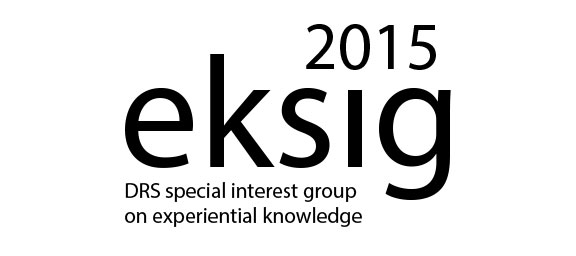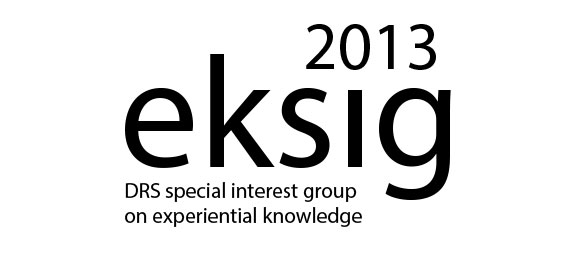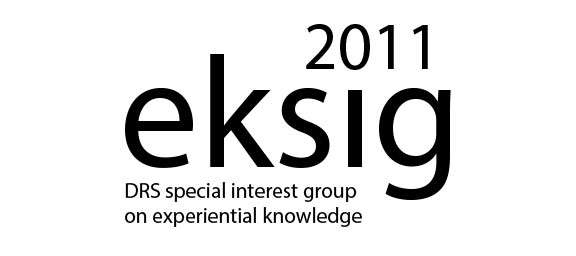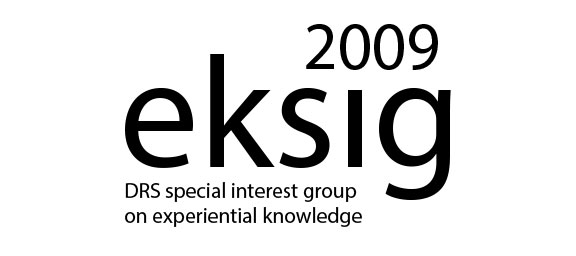EKSIG 2015 Tangible Means - experiential knowledge through materials
International Conference of the DRS Special Interest Group on Experiential Knowledge at Design School Kolding, 2015
Date: Wednesday and Thursday, 25-26 November 2015
Venue: Design School Kolding, Denmark
EKSIG 2015 addresses the theme of 'Tangible Means - experiential knowledge through materials'.
- Lene Tanggaard Pedersen, Aalborg University, Denmark
- Elvin Karana, Delft University of Technology, The Netherlands
- Carol Collet, Central Saint Martins, University of the Arts London, UK
With the theme, the conference aims to provide a forum for debate about materials as a means for knowledge generation by professionals and academic researchers, exploring the role and relationship of generating and evaluating new and existing knowledge in the creative disciplines and beyond.
In recent years many creative disciplines have shifted focus from what is produced to why it is produced and how it is used. This includes a growing interest for combining craft traditions with design and other related issues such as sustainability. As early as 1983 Schön defined designing “as a conversation with the materials of a situation” (Schön, 1983: 78) and the designer as a maker of things even though it is acknowledged that the concept of design can be broader than ‘making things’. Also in the 1980s Manzini (1989: 17) pointed out a need for further development of cognitive tools and cultural references in order to catch up with the technical and scientific development of materials. Recently Karana et al. (2014) have expressed a need to study not only the functional but also the experiential side of materials. Thus, material knowledge is not only about ‘scientific’ facts such as functional and technical properties. It also encompasses personal, experiential, cultural, emotional, environmental and social aspects. In many disciplines, materials pervade all parts of practice, from the processes to the creation of artefacts and/or other kinds of physical manifestations and the interpretation through other professionals, such as curators, critics, historians etc.
This conference welcomes contributions exploring and discussing materials in relation to sensuous qualities, objects, context, strategy, service, space, time, place, techniques, discipline, domain, production, sustainability, interaction, use, metaphors, imaginations, associations, reflective thinking, etc. We interpret materials here in the widest possible sense to include any kind of creative outputs in whatever formats. With this conference, we wish to explore different ways in which experiential knowledge through materials can be given more appropriate consideration within the framework of research. This may include for example investigations into the nature, aims, validity, evaluation and/or necessity of different modes of communication and exchange.
Questions of interest are for example:- What do we mean when we say ‘material knowledge’?
- What are the current understandings of material as a knowledge generator
- Why might materials be important for any research conduct?
- How can materials be utilised within the framework of research?
- How can we articulate material knowledge, which might be tacit and embodied within the process of research?
- What frameworks are there to guide the communication of material knowledge
- What differences are there between the pure sensing of materials and sensing of materials in a context?
- What means and methods can be utilised to transfer and replicate material knowledge?
- How can knowledge about materials be integrated and used within the framework of research?
- How can we articulate and/or communicate material knowledge within the process of research?
- What contribution can the use of creative practices make to the understanding and communication of material knowledge in research?
- What means and methods do we have to transfer and iterate material knowledge
- What and how can we know from materials through research regarding the aspects of personal, experiential, cultural, emotional environmental and social issues?
Conference Organizers
Anne Louise Bang, Design School Kolding, Denmark
Nithikul Nimkulrat, Estonian Academy of Arts, Estonia
Kristina Niedderer, University of Wolverhampton, UK
Program Committee
Anne Louise Bang, Design School Kolding, Denmark
Jacob Buur, University of Southern Denmark, Denmark
Irene Alma Lønne, Design School Kolding, Denmark
Anders Haug, University of Southern Denmark, Denmark
- Karana, E., Pedgley, O., & Rognoli, V. (2014) (eds.). Materials Experience: Fundamentals of Materials and Design. Oxford: Butterworth-Heinemann.
- Manzini, E. (1989). The Material of Invention: Material and Design. Cambridge, MA: The MIT Press.
- Schön, D. (1983).The Reflective Practitioner. How Professionals Think in Action. London: Ashgate.



